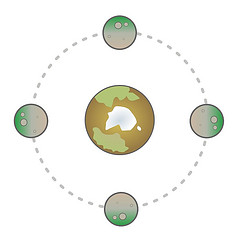Relativism either applies to itself or it doesn’t.
If it does, then it’s only relatively true.
If it doesn’t, then there’s an absolute truth.
Relativism either applies to itself or it doesn’t.
If it does, then it’s only relatively true.
If it doesn’t, then there’s an absolute truth.

If the moon orbits the earth, always presenting the same face to us, does it rotate on its own axis?
It seems a simple question, but its appearance in the London Times in April 1856 set off a war among the English intelligentsia:
The answer, as William James would note in his parable of the squirrel, is that “which party is right depends on what you practically mean” by the term in question. Today we’d say that the moon rotates about its axis in the same time it takes to orbit the earth.
Incidentally, Lewis Carroll submitted two letters, but the Times didn’t print them. Perhaps it’s just as well — he was far ahead of everyone else: “I noticed for the first time the fact that though [the moon] only goes 13 times round the earth in the course of the year, it makes 14 revolutions round its own axis, the extra one being due to its motion round the sun.”
‘If a man followed the directions of a street-car company,’ said Jones, ‘he would never enter one of its cars. Once in, paradoxically, he would never leave it. Just read that sign; it says, ‘Passengers are forbidden to enter or leave this car while in motion.’ Now, how in the name of Lindley Murray can a passenger do otherwise than get in motion, while leaving or entering a street car?’
— Marshall Brown, Bulls and Blunders, 1893

A 12th-century version of the liar paradox:
Socrates swears that he will speak only falsehoods about you.
Then he says, “You are a stone.”
This shows that a man can lie and speak the truth at the same time.
Bertrand Russell admired G.E. Moore’s dedication to the truth.
“I have never but once succeeded in making him tell a lie,” he wrote, “and that was by a subterfuge.
“‘Moore,’ I said, ‘do you always speak the truth?’
“‘No,’ he replied.
“I believe this to be the only lie he ever told.”
Arguments against Galileo:
“Animals, which move, have limbs and muscles; the earth has no limbs or muscles, therefore it does not move.” — Scipio Chiaramonti, University of Pisa, 1633
“Buildings and the earth itself would fly off with such a rapid motion that men would have to be provided with claws like cats to enable them to hold fast to the earth’s surface.” — Libertus Fromundus, Anti-Aristarchus, 1631
“If we concede the motion of the earth, why is it that an arrow shot into the air falls back to the same spot, while the earth and all the things on it have in the meantime moved very rapidly toward the east? Who does not see that great confusion would result from this motion?” — Polacco, Anticopernicus Catholicus, 1644
More recent:
“[Astronomers give the rate of Earth’s rotation as 1,000 kilometers per hour.] An aircraft flying at this rate in the same direction as that of the rotation could not cover any ground at all. It would remain suspended in mid-air over the spot from which it took off, since both speeds are equal. There would, in addition, be no need to fly from one place to another situated on the same latitude. The aircraft could just rise and wait for the desired country to arrive in the ordinary course of the rotation, and then land; although it is difficult to see how any plane could manage to touch ground at all on an airfield which is slipping away at the rate of 1,000 kilometers per hour. It might certainly be useful to know what people who fly think of the rotation of the earth.” — Gabrielle Henriet, Heaven and Earth, 1957
See No Spin Zone.

In 1776, Viennese schoolmaster Antonio Felkel factored every number up to 408,000. Few people bought the book, though, so the treasury recalled it and used the paper to make ammunition cartridges.
University of Prague professor J.P. Kulik spent 20 years extending the work to 100,000,000. He published it in six volumes in 1867.
Volume 2 has been lost.
Think of any whole number greater than zero.
If you apply these rules repeatedly, will you always reach 1? Surprisingly, no one knows.
Paul Erdos said, “Mathematics is not yet ready for such confusing, troubling, and hard problems.”